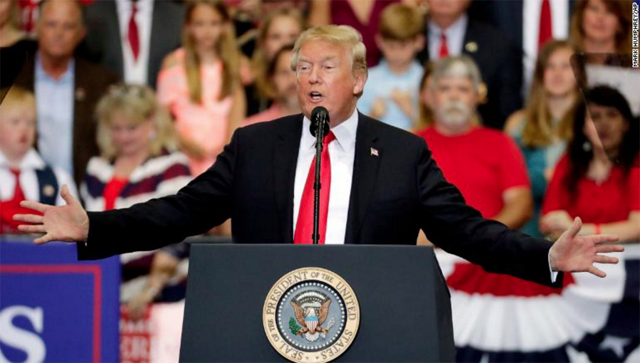America is a great country, but that has nothing to do with President Trump

Trump at a campaign rally in Nashville in May 2018. PHOTO Mark Humphrey/AP
Donald Trump’s signature commitment to Make America Great Again continues to resonate, here as well as in the US. Which raises this question: if America is not currently great, when was it?
Interviewed by the New York Times as a presidential candidate two years ago, when he didn’t seem to mind mainstream media, Trump identified two periods in US history which he most admired.
The first was the early years of the 20th century, which he said he liked for its “wild” entrepreneurship. It was an era dominated by President Theodore Roosevelt.
The second was straight after World War II and in the 1950s, when Harry Truman and Dwight Eisenhower were in charge. Trump said he liked this period because “we were not pushed around, we were respected by everybody”.
That’s one idea of greatness – US commercial and military power projected on to the wider world. But greatness is not just muscle, and there were other aspects of the US story in those times that should have given him pause for thought.
While Teddy Roosevelt liked to wave big sticks at other countries, he was also passionate about nature conservation. He stared down powerful land interests to lock up huge areas of the American West in many national parks and monuments, bird reserves and national forests.
In sharp contrast, Trump’s interior secretary Ryan Zinke has moved to allow oil, gas and metal extraction on reserved lands, while Environmental Protection Agency head Scott Pruitt is on a mission to free business of environmental responsibility.
In the mid-20th century a nuclear-armed US was “respected by everybody”, but it was also a strong voice for international cooperation. America’s generous Marshall Plan helped a war-ravaged Europe get back on its feet; by contrast a feature of Trump’s presidency is hostility toward Europe.
There is another difference. In the 1940s the US led the push to establish the United Nations and provided its New York headquarters, and has since broadly supported the world body both financially and by adhering to agreements and protocols.
Last year Trump announced that he was pulling his country out of the UN’s landmark ecological agreement in Paris in 2015 – the first time all the world’s nations had agreed on the common goal of stopping global warming. Though far from fatal, the US withdrawal was a big setback.
Trump’s 18 months at the helm have been devastating for his country’s hard-earned reputation as a friend of liberal democracy and an enemy of tyrants. He has taken America in the opposite direction, making friends with repressive regimes while alienating democratic allies.
America’s founding fathers saw fit to build checks and balances into its constitution, such that all power could never reside in the president’s hands. Congress was one of those checks; the judiciary another. Another essential arm of liberal democracy is the press.
Every democracy needs independent news media ready and able to call out misbehaviour by powerful interests, including governments and their agencies, and that has never been more crucial than today. Yet at his rallies Trump has persisted in calling them “enemies of the people”.
He surely would have been rethinking this attitude in expressing concern about last week’s shooting of five people at a Maryland newspaper office. We must hope so.
Every leader in every election in every democracy promises that the swamp will be drained, corruption stopped, promises kept. Trump grabbed attention because he was a newcomer with a stage presence and no political past.
Trump is clearly not what my mother would have called a “nice man”, but Americans didn’t elect him for that. They were fed up with leaders who broke campaign promises while doing nothing about corruption. Some felt that as he was already wealthy he wouldn’t be open to bribes.
But life is not so straightforward. It was a mistake to think that Trump could fix things, just as it would have been for Barak Obama, or for that matter Malcolm Turnbull. Government is about many things and many people, and no amount of charisma will alter that.
Not being a scholar and barely even a reader, Trump understands little about checks and balances, separation of powers and the overarching authority of the US constitution. Like many who voted for him, he seems to assume that being president means everyone must do his bidding.
He chafes over opposition from US academics, scientists and the news media, and his failure to bring justice officials and the FBI to heel. But good democratic government needs independent institutions. It takes multiple viewpoints to deal with our complex human world.
For all its many and glaring faults, the US deserves our gratitude for its past and continuing contribution to global order, to democratic process and the rule of law, to science, technology, environmental awareness, literature, performing and visual arts and much more.
America is great not because of Trump but in spite of him, and it will still be so long after he and his presidency have become a distant memory.
